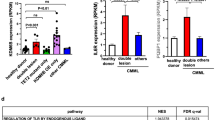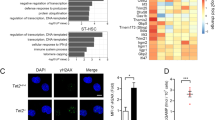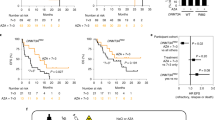Abstract
Identifying genetic pathways that cooperate in leukemogenesis facilitates our understanding of the molecular mechanisms at play. Interferon consensus sequence-binding protein (ICSBP) is a tumor suppressor, whose downregulation cooperates with BCR-ABL and NUP98-TOP1 gene products to accelerate leukemia induction in mouse models. Similarly, Meis1 synergizes with HoxA9 or NUP98-HOX (but not NUP98-TOP1) fusion genes to promote the early onset of leukemia. To investigate whether Icsbp deficiency interacts with Meis1 or its family member Meis3, we transplanted Icsbp−/− bone marrow (BM) cells after transduction with Meis1 or Meis3 retroviral vectors. Here, we show that enforced expression of Meis1 or Meis3 in Icsbp−/− BM cells induces a fatal, invasive myeloproliferative disease. Secondary mutations, such as activation of Mn1, led to the progression to acute myeloid leukemia in a few mice. Interestingly, expression of endogenous Meis1 and Meis3 mRNAs was repressed in the granulocytic progenitor population of Icsbp−/− mice. These results reveal a novel collaboration between Icsbp deficiency and Meis1/Meis3 in the acceleration of chronic myeloid leukemia-like disease.
This is a preview of subscription content, access via your institution
Access options
Subscribe to this journal
Receive 50 print issues and online access
$259.00 per year
only $5.18 per issue
Buy this article
- Purchase on Springer Link
- Instant access to full article PDF
Prices may be subject to local taxes which are calculated during checkout



Similar content being viewed by others
References
Burchert A, Cai D, Hofbauer LC, Samuelsson MK, Slater EP, Duyster J et al. (2004). Interferon consensus sequence binding protein (ICSBP; IRF-8) antagonizes BCR/ABL and down-regulates bcl-2. Blood 103: 3480–3489.
Diaz-Blanco E, Bruns I, Neumann F, Fischer JC, Graef T, Rosskopf M et al. (2007). Molecular signature of CD34(+) hematopoietic stem and progenitor cells of patients with CML in chronic phase. Leukemia 21: 494–504.
Gabriele L, Phung J, Fukumoto J, Segal D, Wang IM, Giannakakou P et al. (1999). Regulation of apoptosis in myeloid cells by interferon consensus sequence-binding protein. J Exp Med 190: 411–421.
Gurevich RM, Rosten PM, Schwieger M, Stocking C, Humphries RK . (2006). Retroviral integration site analysis identifies ICSBP as a collaborating tumor suppressor gene in NUP98-TOP1-induced leukemia. Exp Hematol 34: 1192–1201.
Hao SX, Ren R . (2000). Expression of interferon consensus sequence binding protein (ICSBP) is downregulated in Bcr-Abl-induced murine chronic myelogenous leukemia-like disease, and forced coexpression of ICSBP inhibits Bcr-Abl-induced myeloproliferative disorder. Mol Cell Biol 20: 1149–1161.
Holtschke T, Lohler J, Kanno Y, Fehr T, Giese N, Rosenbauer F et al. (1996). Immunodeficiency and chronic myelogenous leukemia-like syndrome in mice with a targeted mutation of the ICSBP gene. Cell 87: 307–317.
Kelly LM, Gilliland DG . (2002). Genetics of myeloid leukemias. Annu Rev Genomics Hum Genet 3: 179–198.
Kroon E, Krosl J, Thorsteinsdottir U, Baban S, Buchberg AM, Sauvageau G . (1998). Hoxa9 transforms primary bone marrow cells through specific collaboration with Meis1a but not Pbx1b. EMBO J 17: 3714–3725.
Kroon E, Thorsteinsdottir U, Mayotte N, Nakamura T, Sauvageau G . (2001). NUP98-HOXA9 expression in hemopoietic stem cells induces chronic and acute myeloid leukemias in mice. EMBO J 20: 350–361.
Lawrence HJ, Rozenfeld S, Cruz C, Matsukuma K, Kwong A, Komuves L et al. (1999). Frequent co-expression of the HOXA9 and MEIS1 homeobox genes in human myeloid leukemias. Leukemia 13: 1993–1999.
Moskow JJ, Bullrich F, Huebner K, Daar IO, Buchberg AM . (1995). Meis1, a PBX1-related homeobox gene involved in myeloid leukemia in BXH-2 mice. Mol Cell Biol 15: 5434–5443.
Nakamura T, Jenkins NA, Copeland NG . (1996). Identification of a new family of Pbx-related homeobox genes. Oncogene 13: 2235–2242.
Pineault N, Abramovich C, Ohta H, Humphries RK . (2004). Differential and common leukemogenic potentials of multiple NUP98-Hox fusion proteins alone or with Meis1. Mol Cell Biol 24: 1907–1917.
Pineault N, Buske C, Feuring-Buske M, Abramovich C, Rosten P, Hogge DE et al. (2003). Induction of acute myeloid leukemia in mice by the human leukemia-specific fusion gene NUP98-HOXD13 in concert with Meis1. Blood 101: 4529–4538.
Scheller M, Foerster J, Heyworth CM, Waring JF, Lohler J, Gilmore GL et al. (1999). Altered development and cytokine responses of myeloid progenitors in the absence of transcription factor, interferon consensus sequence binding protein. Blood 94: 3764–3771.
Schmidt M, Bies J, Tamura T, Ozato K, Wolff L . (2004). The interferon regulatory factor ICSBP/IRF-8 in combination with PU.1 up-regulates expression of tumor suppressor p15(Ink4b) in murine myeloid cells. Blood 103: 4142–4149.
Schmidt M, Hochhaus A, Nitsche A, Hehlmann R, Neubauer A . (2001a). Expression of nuclear transcription factor interferon consensus sequence binding protein in chronic myeloid leukemia correlates with pretreatment risk features and cytogenetic response to interferon-alpha. Blood 97: 3648–3650.
Schmidt M, Hoffmann G, Wissler M, Lemke N, Mussig A, Glimm H et al. (2001b). Detection and direct genomic sequencing of multiple rare unknown flanking DNA in highly complex samples. Hum Gene Ther 12: 743–749.
Schmidt M, Nagel S, Proba J, Thiede C, Ritter M, Waring JF et al. (1998). Lack of interferon consensus sequence binding protein (ICSBP) transcripts in human myeloid leukemias. Blood 91: 22–29.
Schwieger M, Lohler J, Friel J, Scheller M, Horak I, Stocking C . (2002). AML1-ETO inhibits maturation of multiple lymphohematopoietic lineages and induces myeloblast transformation in synergy with ICSBP deficiency. J Exp Med 196: 1227–1240.
Serrano E, Lasa A, Perea G, Carnicer MJ, Brunet S, Aventin A et al. (2006). Acute myeloid leukemia subgroups identified by pathway-restricted gene expression signatures. Acta Haematol 116: 77–89.
Slape C, Hartung H, Lin YW, Bies J, Wolff L, Aplan PD . (2007). Retroviral insertional mutagenesis identifies genes that collaborate with NUP98-HOXD13 during leukemic transformation. Cancer Res 67: 5148–5155.
Turcotte K, Gauthier S, Tuite A, Mullick A, Malo D, Gros P . (2005). A mutation in the Icsbp1 gene causes susceptibility to infection and a chronic myeloid leukemia-like syndrome in BXH-2 mice. J Exp Med 201: 881–890.
Wang GG, Pasillas MP, Kamps MP . (2006). Persistent transactivation by meis1 replaces hox function in myeloid leukemogenesis models: evidence for co-occupancy of meis1-pbx and hox-pbx complexes on promoters of leukemia-associated genes. Mol Cell Biol 26: 3902–3916.
Zhu C, Saberwal G, Lu Y, Platanias LC, Eklund EA . (2004). The interferon consensus sequence-binding protein activates transcription of the gene encoding neurofibromin 1. J Biol Chem 279: 50874–50885.
Acknowledgements
We thank Drs T Nakamura (Japanese Foundation for Cancer Research) and T Kitamura (Institute of Medical Science, University of Tokyo) for Meis1a cDNA and pMYs-IG vectors, respectively. We also thank Susanne Roscher and Silvia Dolski for assistance. This study was supported by the Human Science Foundation, the Ministry of Education, Culture, Sports, Science and Technology of Japan and the German José Carrreras Leukemia Foundation. The Heinrich-Pette-Institut is supported by the Freie und Hansestadt Hamburg and the Federal Ministry of Health and Social Security.
Author information
Authors and Affiliations
Corresponding author
Additional information
Supplementary Information accompanies the paper on the Oncogene website (http://www.nature.com/onc).
Supplementary information
Rights and permissions
About this article
Cite this article
Hara, T., Schwieger, M., Kazama, R. et al. Acceleration of chronic myeloproliferation by enforced expression of Meis1 or Meis3 in Icsbp-deficient bone marrow cells. Oncogene 27, 3865–3869 (2008). https://doi.org/10.1038/sj.onc.1211043
Received:
Accepted:
Published:
Issue Date:
DOI: https://doi.org/10.1038/sj.onc.1211043
Keywords
This article is cited by
-
Irf8 regulates the progression of myeloproliferative neoplasm-like syndrome via Mertk signaling in zebrafish
Leukemia (2018)
-
Constitutive IRF8 expression inhibits AML by activation of repressed immune response signaling
Leukemia (2015)
-
Regulation of myelopoiesis by the transcription factor IRF8
International Journal of Hematology (2015)



